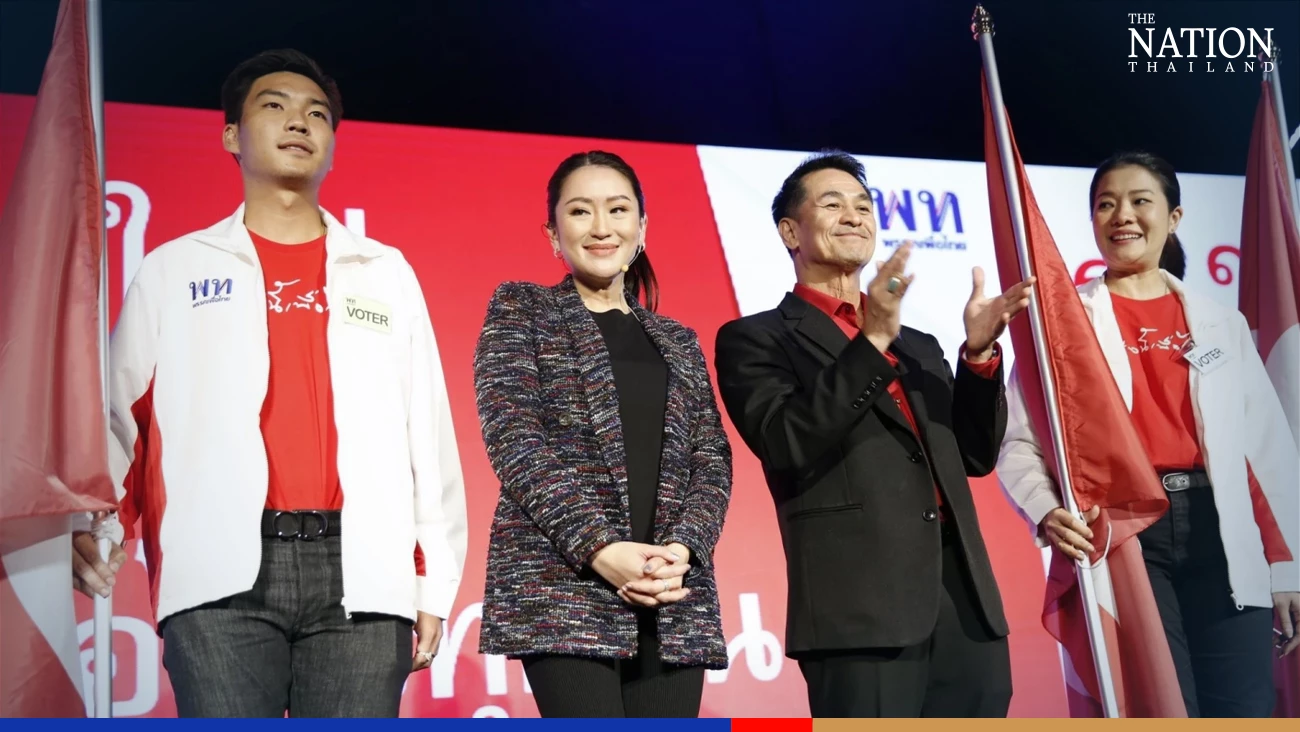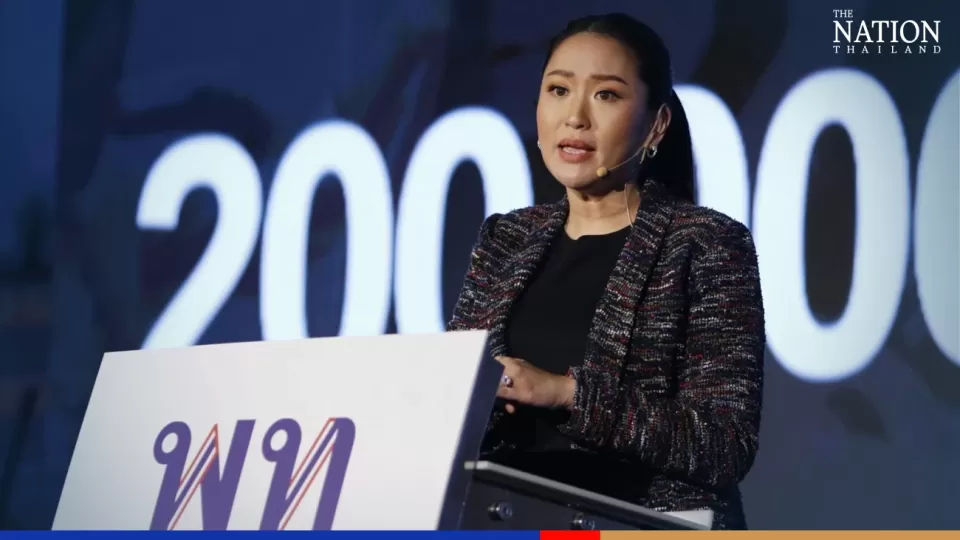December 7, 2022
BANGKOK – Speaking at the party’s caucus at the Pheu Thai Party head office, Paetongtarn Shinawatra revealed her vision of running the country for the next four years if her party secures a landslide victory in next year’s general election.
Paetongtarn, who is the chairperson of Pheu Thai’s advisory committee on public inclusion and innovation and head of the Pheu Thai Family project, is tipped to become the next prime minister if her party wins the election, tentatively scheduled for May 7.
The Pheu Thai held its caucus on Tuesday to formally kick off its campaign for the next election. The highlight of the caucus was the speech by Paetongtarn, who unveiled her 10 economic and social policies.
She said she and her delegates had visited many provinces during the past year to study people’s grievances and issues to come up with the 10 policies.
She said her travels during the year had shown that Thailand has regressed significantly economically, politically and socially under the current government. She said Thailand has regressed so much that it has lost its prominence in the eyes of the international community.
She said a lot of people have accumulated huge amounts of debt and the accumulated issues of Thailand will be tackled through her “Think Big, Doable” platform.
She pledged that if a Pheu Thai-led coalition formed the next govermment, it would spend the next four years reducing the expenses of the people while increasing their income and making Thais much richer by 2027.

The 10 policies Paetongtarn unveiled on Tuesday are:
• Economy: From 2023 to 2027, the Pheu Thai-led government would take steps to boost Thailand’s GDP growth to 5 per cent per year. It will attempt to reduce the wealth gap under the theme “watering the grassroots”.
The Pheu Thai government would use “soft power” to drive the economy by encouraging chefs, designers, architects, singers, song composers, scriptwriters, YouTubers and other professions to use soft power to earn income. Each of them would earn at least 200,000 baht a year.
The government would create 20 million high-skilled jobs that can create an income of 4 trillion baht a year for the country, Paetongtarn said.
By 2027, the daily minimum wage would be raised to 600 baht a day and university graduates would receive a monthly salary of at least 25,000 baht.
• Agriculture: By 2027, the country will use modern agricultural technologies, especially precision agriculture technologies, in farming. Artificial Intelligence will also be used to increase farm production.
• Tourism: By 2027, the country’s income from tourism would rise to 3 trillion baht a year.
• Innovation: The Pheu Thai government would develop an online blockchain-based transaction network of Thailand for farmers to sell their farm products. The network also will be used to distribute assets from soft power-related businesses and to raise funds for startups and small and medium-sized enterprises.
The Pheu Thai government would seriously support and promote research to make Thailand a hub of innovation in Asean. The country will develop a Central Bank Digital Currency to use in lieu of cash and people will have digital wallets. All corners of the nation will have free Wi-Fi access.
• Public health: By 2027, Thailand’s universal healthcare gold card system would be upgraded to allow Thais to receive free medical services from any hospital in the country by simply showing their ID card.
State hospitals would be decentralised to become public organisations and they would have enough doctors and medical personnel to cope with the number of patients. The country will invest heavily to develop modern medical gears that will be available from tambon to large cities. Public health volunteers will be trained as nurses for villages.
• Education: Administrative power for school management would be decentralised as in other developed countries. Bilingual schools will be available in all districts to teach in both English and Chinese languages from Grade 1. Studying could be done both onsite and online, with foreign teachers assisting Thai teachers.
• Drug: The Pheu Thai government would step up suppression of narcotics trafficking to eliminate illicit drugs from the country.
• Basic infrastructure: The Pheu Thai government would tackle both drought and floods with systematic and comprehensive measures. Canals would be dug to connect major rivers, and monkey-cheek reservoirs would be built along major waterways for effective floodwater draining.
Landfilling will be undertaken on the seashore along the Bang Khun Thian district as well as in Samut Prakan and Samut Sakhon provinces to prevent the rising sea from affecting Bangkok. There would be plenty of public lands along the coasts for public purposes.
• Transport: By 2027, Thailand would become the logistics hub for Asean. The Pheu Thai government would invest massively in railway systems. Double-track railways would run to major provinces, such as Chiang Rai, Mukdahan, Nakhon Phanom and Phuket, to allow trains to run at 160 kilometres per hour to cut travel time by half. High-speed railway from China would be extended to Singapore.
The management systems of all electric trains in Bangkok and surrounding provinces would be overhauled so that a common ticketing system could be used at 20 baht per trip.
The capacity of Suvarnabhumi Airport would be expanded from 45 million passengers to 100 million.
• Energy: The energy price system would be overhauled to reduce the prices of petrol, cooking gas, and electricity.
Campaigns will be launched for households to use solar power panels to reduce power bills, and reduce the country’s oil bill for generating power.
Paetongtarn added that the Pheu Thai government would also push for reform of political rules so that the country would have genuine democracy and the prime minster would be elected only by people’s representatives in the House, not the Senate.
She said the Pheu Thai government would also use advanced computer programmes to monitor the spending of taxpayers’ money by government agencies to ensure integrity and transparency.


